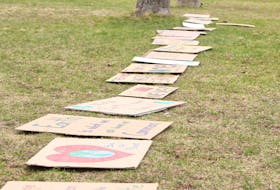By Vick Allen
During the occupation of the Muskrat Falls Lower Churchill project site, I took part in a sit-in at Confederation Building. As I sat there, I began to wonder about Truth and Reconciliation. I began questioning what we, the people, were doing to facilitate reconciliation within the province. I then thought about what they, Nalcor Energy, were doing.

I’ve read portions of the Labrador Inuit Land Claims Agreement (LILCA) but none pertaining to water and land rights, so I brushed up. I also read all 94 Calls to Action put forward by the Truth and Reconciliation Commission of Canada. I focused on business and reconciliation. When it comes to a business that wishes to develop Indigenous resources and lands, Call to Action 92 calls on businesses to: “Commit to meaningful consultation, building respectful relationships, and obtaining the free, prior, and informed consent of Indigenous peoples before proceeding with economic development projects.”
Consultations occurred. Relationships were respectful. Informed consent was given by one of three Indigenous groups in the region. Each aspect, with respect to this call, was met. I then wondered what our Indigenous legal rights were. Specifically, the rights afforded to the Nunatsiavut Government after the LILCA was signed and ratified. I took a look at the water rights. In LILCA under Chapter 5, Section 5.3.2 states: “Subject to this chapter, Inuit have the right to enjoy water that is on, in, under, flowing through or adjacent to the Labrador Inuit Lands substantially unaltered as to quantity, quality and rate of flow.”
While Lake Melville is not Labrador Inuit lands, it is adjacent to Labrador Inuit lands and is part of the Labrador Inuit settlement area. LILCA Section 5.2.6 states: “Nothing in this chapter permits a person to discharge waste into water without a water use permit from the minister.”
Visit the place that you are developing. Speak to the people. Build a connection to them and to the land before you break ground.
If you read a little further, Section 5.4.14 states: “Notwithstanding that the definition of water does not include tidal waters, if a power development is proposed within the area set out in the Map Atlas … that substantially alters the quantity, quality or rate of flow of tidal waters adjacent to Labrador Inuit lands within the area shown in schedule 5-A, the development shall not be permitted to proceed until the Nunatsiavut Government and the developer have concluded a compensation agreement, Inuit shall be entitled to claim for losses likely to result from the substantial alteration to the quantity, quality or rate of flow of the tidal waters adjacent to Labrador Inuit Lands within the area shown in schedule 5-A.”
Here’s where it gets complicated. The water from the Muskrat Falls Lower Churchill project will flow into the land claim area. However, because neither Lake Melville nor Muskrat Falls is on Labrador Inuit lands, they technically do not have to negotiate with the Nunatsiavut Government. They do not have to obtain a permit to discharge waste into water and they are not required to develop a compensation agreement.
Interestingly, compensation was suggested. It has been rejected by the Nunatsiavut Government, which took its response directly from the Inuit in the Lake Melville region. The response from the people was: “You cannot put a price on our way of life.” Both parties seem to be at a standstill. Nalcor Energy stands to lose months of preparation and possibly suffer damage to the dam if the project is not permitted to proceed. On the other hand, the Inuit of Lake Melville (myself included) are terrified that their main food source will be poisoned after the floodwaters are released.
What can we take from this situation? How can we avoid this in the future? How can we promote reconciliation in this province? In order to facilitate true reconciliation with regard to business, it must be taken further than what the Call to Action recommends.
Don’t simply consult. Listen. Listen to the concerns of the people whose lives you will be impacting. Build respectful relationships. Visit the place that you are developing. Speak to the people. Build a connection to them and to the land before you break ground. When I spoke about respect earlier, it is more akin to being cordial than respect. True respect comes when you get to know people, understand their lives, and appreciate the daily struggles they face.
When obtaining consent from the Indigenous people, ensure that all Indigenous groups are consulted.
Above all, before developing lands that we, as Indigenous people, have occupied for thousands of years, ensure that we are able to continue to survive. Because we live in the Arctic, it is imperative that we adapt to survive. We are good at it. But we cannot adapt to poison.
About the Author
Vick Allen (St. John’s Native Friendship Centre) is an Inuk from Rigolet, Nunatsiavut. She holds a bachelor of arts in archeology from Memorial University of Newfoundland. After finishing as the conference co-ordinator for the Inuit Studies Conference, she became the catering co-ordinator at the St. John’s Native Friendship Centre. Her passions include cooking and advocating.









